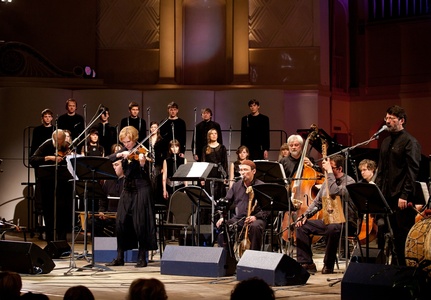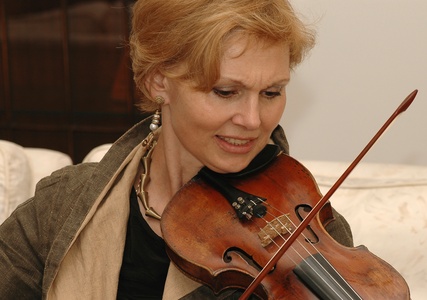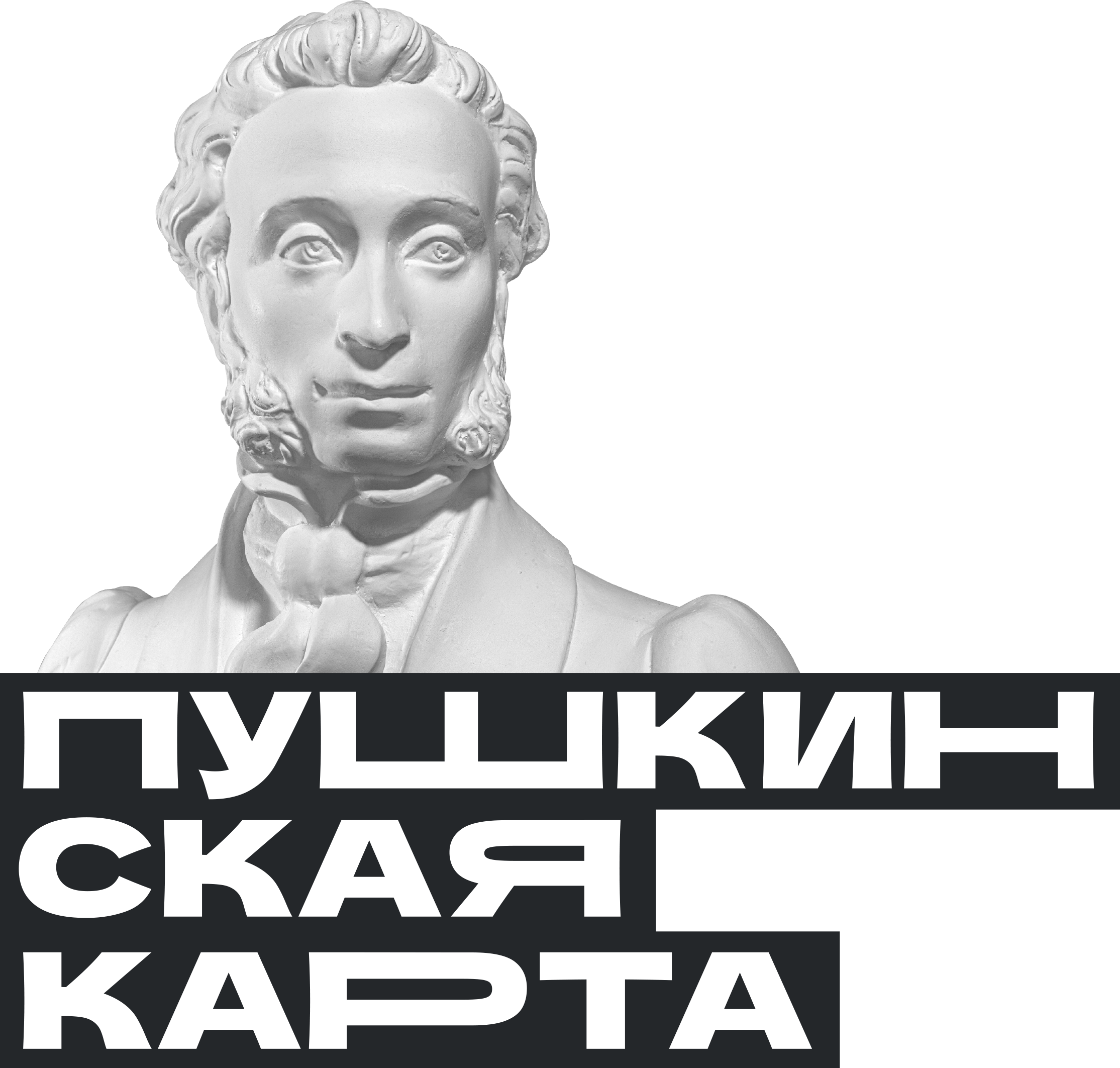Academy of Early Music Ensemble of the Moscow Philharmonic
Tatiana Grindenko (violin)
Galina Mashinskaya (spoken word artist)

Subscription №243:
Magic world of music and fairytales
Academy of Early Music Ensemble of the Moscow Philharmonic
The ensemble was established in 1982 by Tatiana Grindenko, famous violinist, winner of international competitions. From their first performances, the musicians proved to be a team of unlimited potential, capable of meeting most daunting artistic challenges. Since 1987 the ensemble has been part of the Moscow Philharmonic.
The Academy established the tradition of authentic early music performing in Russia. 30 years later, the musicians still adhere to this style, playing authentic old instruments, using baroque bows and conveying the spirit and meaning of the music of bygone age: Monteverdi, Pergolesi, Vivaldi, Geminiani, Corelli, Galuppi, Purcell, Buxtehude, Bach, Handel, Telemann, Mozart father and son, Boamortier, Fomin, Bortnyansky, Pashkevich and many other period composers. Since the 1990s, the Ensemble’s repertoire has been complemented with specially commissioned pieces by Vladimir Martynov, Ivan Sokolov, Alexander Bakshi and other contemporary composers.
The Ensemble gained worldwide reputation appearing at prestigious international festivals (in Russia, Austria, Belgium, USA, Spain, Italy, Czech Republic, Finland, Sweden and many other countries), collaborating with such outstanding musicians as Nikolaus Harnoncourt, Martin Bornus-Szczyciński, Irena Grafenauer, Gidon Kremer, Mark Tucker, Robert Hall, Thomas Zehetmair, Andreas Staier and others. The Academy of Early Music has participated in the world premieres of The Exercises and Dances of Guido by Martynov at Sacro Art festival (Lockum, Germany, 1997); Il re pastore composed by Galuppi for the coronation of Catherine the Great and considered as lost for over 200 years (Udine, Italy, 1998), and Mozart and Salieri at the Dramatic Art School (director Anatoly Vasiliev, composer Vladimir Martynov, Moscow, 1999, for the 200th anniversary of Alexander Pushkin). Tatiana Grindenko was the musical direction of all the productions.
In 1999, specially for New Sacred Space project, Tatiana Grindenko created the Opus Posth. Ensemble within the Academy of Early Music. The whole concept relies on the idea of the composer Vladimir Martynov, which determines both the name of the ensemble and the musicians’ vision of contemporary cultural situation. The potential of composer music (opus music) has been exhausted, so opus-posth.-music is something what follows and replaces this opus music. The ensemble creates a new space, adding the ritual of sacred music to their performances, handling archaic traditions while using the latest composing methods. Their repertoire includes pieces by John Adams, Charles Ives, Anton Batagov, Steven Gerber, Philip Glass, Leonid Desyatnikov, Paul Drescher, Sergey Zagny, Hermes Zaigott, Giya Kancheli, Pavel Karmanov, John Cage, Alexander Knaifel, Iannis Xenakis, Vladimir Martynov, Michael Nyman, Georgs Pelēcis, Arvo Pärt, Terry Riley, Steve Reich, and Valentin Silvestrov.
The Ensemble has presented a number of multimedia projects including Night in Galicia, Games of Angels and People, The Song of Songs, Bach 2000, German Requiem, Death of a Wild Warrior and others. In 2004 Opus Posth. participated in Go and Stop the Progress, a play based on the verses of the Oberiuts, staged by Yuri Lyubimov for the 40th anniversary of the Taganka Theater (music by Martynov) and in the experimental production of Die Zauberflöte (directed by Ekaterina Pospelova and conducted by Tatiana Grindenko). In 2006 Opus Posth. participated in Orpheus and Eurydice, a melodrama by Evstigney Fomin (directed by Ilya Epelbaum, Moscow). 2012 saw the premiere of Children of the Otter, ethnomythological performance by Vladimir Martynov, jointly created with the Tuvan ensemble Huun-Huur-Tu.
Academy of Early Music and Opus Posth. have made numerous radio and television records for Melodiya, Eurodisc, Ondine, RCA, ECM, Erdenklang Musikverlag, CCn'C Records, Wergo, Deutsche Grammophon, Opus 111 and other labels.
Tatiana Grindenko
Tatiana Grindenko is a graduate of the Moscow State Tchaikovsky Conservatoire and student of renowned professors Yuri Yankelevich and Maya Glezarova. Prize-winner at many international competitions induding the Tchaikovsky and Wieniawski Competitions; People's Artist of Russia. Recipient of the State Prize of Russia (2003) for outstanding achievements in music.
Tatiana Grindenko's musical interests have never been confined to academic music. Tatiana Grindenko was a member of Boomerang, one of the USSR's first rock groups, and subsequently of Forpost. She has taken part in various avant-garde events and festivals. In 1980, Tatiana Grindenko and Alexei Lyubimov formed the USSR's first baroque ensemble, the Academy of Early Music, using authentic 17th and 18th century performance techniques which she still employs to this day.
Since 1989 Tatiana Grindenko has appeared with world-famous orchestras such as Wiener Philharmoniker, Berliner Philharmoniker, Dresden Staatskapelle, Leipzig Gewandhaus and symphony orchestras of Los Angeles, Milan, Turin, Rome, Moscow and St. Petersburg. On stage, Tatiana Grindenko has been partnered by such outstanding musicians as Kurt Masur, Kurt Sanderling, Kirill Kondrashin, Gennady Rozhdestvensky, Yuri Temirkanov, Mstislav Rostropovich, Gidon Kremer, Frans Brüggen, Alexei Lyubimov and Alexander Knyazev. Renowned composers including Alfred Schnittke, Arvo Part, Vladimir Martynov, Luigi Nono and Valentin Silvestrov have all composed works specially for Tatiana Grindenko. Tatiana Grindenko's music has been recorded by international companies including Melodia, Eurodisk, Ondine, Deutsche Grammophon, Erdenklang Musikverlag & CCn'C RECORDS, RCA, ECM, Wergo and Long Arms Records. Tatiana Grindenko has managed numerous theatre productions and performances. They include the operas Il re pastore by Galuppi, Mozart's Die Zauberflöte (directed by Katya Pospelova), Martynov's Mozart & Salieri and Go and Stop Progress (directed by Anatoly Vasiliev and Yuri Lyubimov) and Fomin's Orpheus (directed by llya Applebaum).
The ensemble Opus Posth. was established in 1999 on the basis of the Academy of Early Music especially for the project New Sacral Space. The ensemble is based on the concept of composer and philosopher Vladimir Martynov, which defines both the name of the ensemble (opus posthumum, posthumous publication of a musical work) and contemporary cultural reality. This has seen such multimedia projects as Night in Galicia, Seasons, Russo-German Requiem, Games of Angels and People, Song of Songs, BACH-2000, There Will Be No Winter, Songs of the Doomed and The Seven Last Words of Christ among others. The ensemble's repertoire includes modern (20th century) and cutting-edge (21 st century) works by Russian and Western composers. Opus Posth. has produced the CDs Hymns, Night in Galicia, Come In!, Requiem and Stabat Mater, Tetractis, Passionslieder, Litany of the Blessed Virgin and Joseph Haydn's The Seven Last Words of Christ, acclaimed by STRAD magazine as best CD of the year (recorded with CCn'C Records and Long Arms Records with support from the Ford Foundation).





